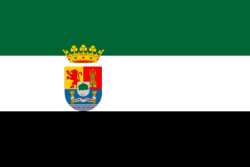Extremadura
|
|
| ||
| Missing image Locator_map_of_Extremadura.png Image:Locator map of Extremadura.png | ||
| Capital | Mérida | |
| Area – Total – % of Spain | Ranked 5th 41 634 km² 8,2% | |
| Population – Total (2003) – % of Spain – Density | Ranked 13th 1 073 050 2,6% 25,77/km² | |
| Demonym – English – Spanish | — extremeño/a, castúo | |
| Statute of Autonomy | February 26, 1983 | |
| ISO 3166-2 | EX | |
| Parliamentary representation – Congress seats – Senate seats | 10 2 | |
| President | Juan Carlos Rodríguez Ibarra (PSOE) | |
| Junta de Extremadura (http://www.juntaex.es) | ||
Extremadura is an autonomous community of Spain. It includes the provinces of Cáceres and Badajoz.
Some important cities are Cáceres, Badajoz, Plasencia and Mérida, the capital of the autonomous community. For other municipalities, see lists by province:
Extremadura borders Portugal to the west. It is an important area for wildlife, particularly with the major reserve at Monfragüe.
Badajoz and Cáceres are, respectively, the largest and second-largest provinces of Spain.
Spain_Extremadura_map.png
Extremadura was the source of many of the most famous conquerors ("conquistadores") and settlers in America. Hernán Cortés, Francisco Pizarro, Pedro de Alvarado, Pedro de Valdivia, etc. were all born in Extremadura and many towns and cities in America carry a name from their homeland: Mérida is the administrative capital of Extremadura, and also an important city in Mexico and Venezuela, Medellín is now a little town in Extremadura, but also the second largest city in Colombia, Albuquerque is the largest city in New Mexico, its name is due to transcription mistake of Alburquerque, another town in Extremadura. Moreover, the two Spanish astronauts up to date, Miguel López-Alegría and Pedro Duque, have family connections in Extremadura.
Extremadura should not be confused with Estremadura, a historical province of Portugal. During the Reconquest, "Extremadura" was the word used to name the land bordering the christian frontier oppossed to moorish resistance; so for a time Extremadura was the name for the present province of Salamanca (the present Cáceres was called "Transierra Leonesa" and the present Badajoz was a moorish kingdom with the same name).
The Extremadura Regional Government has authored its own Linux distribution, LinEx.
Extremeño dialect
- "...possesses a marked aspiration for f h, and employs i u for e o as finals; while modifying variously medial unaccented vowels as andaluz also does. The region is sparsely populated for various reasons: it was much thinned by the emigration to America...the language also shows remarkable archaisms. To the north of Cáceres in Plasencia, Coria and Garrovillas, the medieval distinction between voiced z and voiceless ç remains perceptible...Extremeño is in other respects a dialect of transition between andaluz and the patois of southern León."
- Source: Entwistle, William J. The Spanish Language. (pp. 223–224) This is not true. Only in very isolated areas of the north of Extremadura, at the beginning of the last century (Las Hurdes) did this kind of pronnunciation exist, and it actually employed "i" instead of "e" and "u" instead of "o" at the end of words, such as "miercolis" insteas of Miercoles and Moru instead of moro
See also
External links
A webpage about the idioms and dialects spoken in Extremadura:
- Hablas de Extremadura en la red (spanish) (http://www.galeon.com/hablasdeextremadura/index.html)
| | 
|
|---|---|
| Andalusia | Aragon | Asturias | Balearic Islands | Basque Country | Canary Islands | Cantabria | Castile-La Mancha | Castile-Leon | Catalonia | Extremadura | Galicia | La Rioja | Madrid | Murcia | Navarre | Valencia | Ceuta | Melilla | Plaza de soberanía | |
ca:Extremadura cs:Extremadura de:Extremadura et:Extremadura es:Extremadura eo:Ekstremaduro fi:Ekstramadura fr:Estrémadure it:Estremadura ka:ესტრემადურა hu:Extremadura nl:Extremadura ja:エストレマドゥーラ州 ro:Extremadura sv:Extremadura

